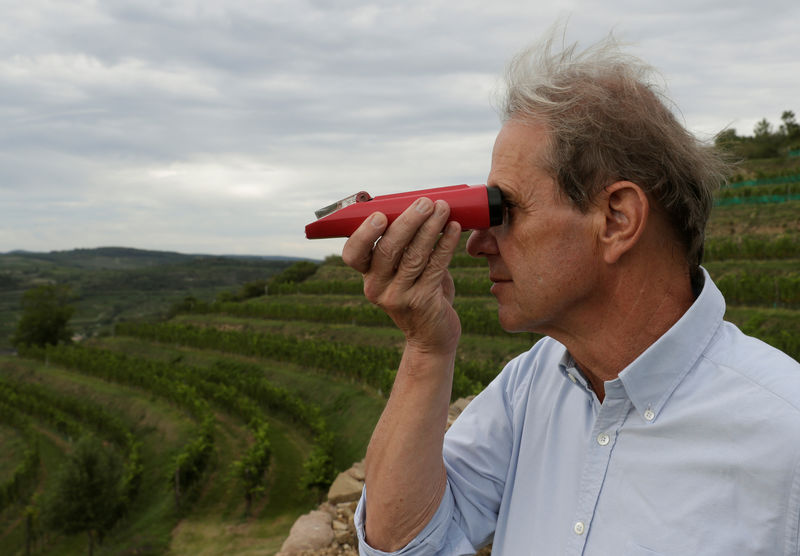By Alexandra Schwarz-Goerlich
VIENNA (Reuters) - One of Austria's leading wine-growing regions, which helped place the environmentalist Greens on the threshold of power in elections last month, has one demand for the new government: save the country's most famous tipple.
A rapidly heating climate threatens Austria's best-known wine, the Gruener Veltliner, which put the Alpine country back on the global map after a scandal over wine contaminated with antifreeze nearly ruined the sector three decades ago.
The Gruener Veltiner grape makes the dry white wine that has become a cult drink not only in the open-air Heuriger taverns that ring the capital Vienna, but also in hip bars from New York to New Zealand.
Rising temperatures affect the sprouting, flowering and maturity of grapevines.
The higher the temperature, the higher the sugar and alcohol content of the grapes, affecting the wine's quality. That spells trouble for winemakers because temperatures have risen 2 degrees in Austria since 1880, more than twice the global average.
"If global warming continues like this, we are really in for a disaster. Our cultural assets -- from skiing to Gruener Veltliner -- are acutely at risk," said Willi Bruendlmayer, one of Austria's best-known winemakers.
His vineyards grace the hills of Lower Austria province in the town of Langenlois, where the Greens more than trebled their share of the vote in parliamentary elections, opening the door for coalition talks with Sebastian Kurz's conservatives.
Kurz has not yet expressed a preference for a partner, and bridging policy differences with the Greens will not be easy. Tackling climate change is not among Kurz's priorities, and his People's Party (OVP) has ruled out a carbon tax that the Greens favour.
Opinion polls show Austrians worry about the environment. President Alexander van der Bellen has urged the next government to put climate change atop the political agenda.
The OVP policy is to reduce carbon output, but not at the expense of commuters and people in rural areas.
"We do not want to ban people from driving when they need to, but we want to significantly reduce CO2 emissions," Kurz has said. This is to be achieved with a complete switch to renewable energy by 2030. Some 72% of Austria's electricity already comes from renewable sources.
TURNING RED
The Gruener Veltliner is by far the most important grape variety in Austria, accounting for more than a third of vineyard plantings, and is the main wine export.
While red wine grapes love warmth, the Veltliner loses its freshness and fine aromas.
"Producers of Gruener Veltliner are coming under pressure because the acidic quality standards can hardly be reached any more," said Josef Eitzinger, climatologist at the University of Natural Resources and Life Sciences.
Wine growing is important for the economy. On average, 2.5 million hectolitres are produced in Austria, mostly for domestic consumption. It exported almost 53 million litres worth 170 million euros ($188 million) in 2018, with Germany the most important market.
"If Austria loses the Gruener Veltliner, a key part of our identity will go missing," sighed Bruendlmayer, one of Austria's largest producers with 600,000 bottles per year.
If warming continues unchecked, the Veltliner in his vineyards will simply no longer grow.
"Now we harvest the Gruener Veltliner four weeks earlier than when I was young," he said.
For new plantings, Bruendlmayer is already moving to higher ground but cultivation areas in Lower Austria are limited.
"And in the warmer areas, we've started to plant more heat-resistant red wines, which are grateful for more heat," he said.
But adjusting to new climatic conditions is not easy, said Josef Glatt, director of the Austrian Winegrowing Association.
"The vineyard is a long-lived culture, 40 to 50 years," he said. Nevertheless, growers are considering moving to other varieties. "It's not that easy or make so much sense because consumers want the Gruener Veltliner" .
